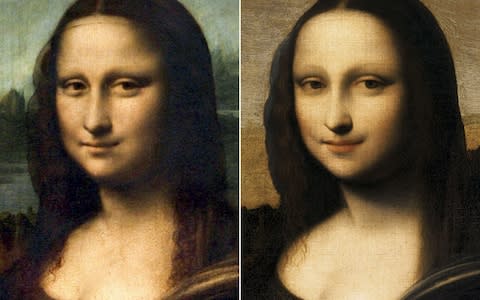British couple claim they are secret 'owners' of early Mona Lisa painting

A British couple are fighting to be recognised as the co-owners of a painting believed by some to be an early version of the Mona Lisa.
The work, found in a Somerset manor house in 1913, mimics Leonardo da Vinci’s masterpiece and appears to be a younger version of the Mona Lisa’s subject, Lisa del Giocondo.
Over the course of the 20th century it passed into the hands of Henry Pulitzer, an eccentric British art collector, and then to Elizabeth Meyer, his partner.
Following her death in 2008, it was acquired by an international consortium, which unveiled it in 2012 amid a blaze of publicity and claims that it was a genuine Leonardo.
However, it is alleged that Pulitzer sold a 25 per cent share in the painting to Leland Gilbert, a business associate, for £4,000 in 1964. Mr Leland, a porcelain manufacturer based in Portugal, has since died.
Andrew Gilbert, his heir, believes his family is entitled to the quarter-share and has what he says is the 1964 document of sale.

He and his wife, Karen, a judge, are taking the case to court in Italy, where the painting was recently put on display.
The consortium, registered to Anguilla, denies the Gilberts’ claim.
The couple, from south-east London, have hired Christopher Marinello, an expert in recovering missing works of art, to handle the case.
Mr Marinello said the question of whether or not the painting was a real Leonardo was beside the point.
“I don’t care if this is a painting of Elvis on black velvet. Whatever it is, 25 per cent of it belongs to the Gilberts,” he said.
If the painting were proved to be the real thing, the Gilberts would be in line for millions. Another disputed Leonardo, the Salvator Mundi, sold two years ago for $450 million despite doubts about its authenticity.
Prof Martin Kemp, a Leonardo expert, has dismissed the idea. He has described the painting as a “no-hoper” and “the most persistent pretender amongst the many copies or variants” of the Mona Lisa out there.

The work “does not capture the profound elusiveness of the original”. Hugh Blaker, the art dealer who found the painting in 1913 – and who kept it in his studio in south-west London, earning it the nickname The Isleworth Mona Lisa – believed it was genuine.
So did Pulitzer, who wrote a book to that effect in 1966. Pulitzer put the work in a Swiss vault in the Seventies, where it stayed until an organisation called the Mona Lisa Foundation – acting on behalf of the consortium, about which little is known – unveiled it in Geneva in 2012.
Giovanni Battista Protti, the couple’s Italian lawyer, said: “When Elizabeth Meyer was still alive, the relationship with our clients was perfect, and we have evidence of this.
“After her death, they lost control of the painting and the trouble started.”
Mr Gilbert, a businessman, is one of Leland Gilbert’s four grandchildren and is taking the case to court on behalf of all of them. He has no idea if the painting is the genuine article, but hopes to put it before experts.
He said: “My grandfather, along with Henry Pulitzer, was passionate about the painting. He would not have invested in it if he didn’t think there was a possibility it was a Leonardo.
“We are honouring my grandfather’s passion and his investment.” A lawyer for the foundation said the Gilberts’ claim is “unfounded”. The hearing has been postponed until March.

 Yahoo News
Yahoo News 